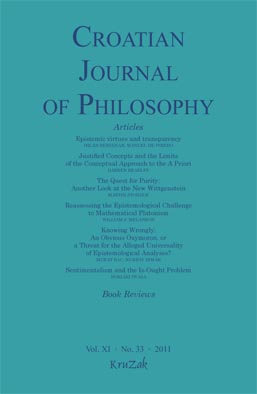Knowing Wrongly: An Obvious Oxymoron, or a Threat for the Alleged Universality of Epistemological Analyses?
Knowing Wrongly: An Obvious Oxymoron, or a Threat for the Alleged Universality of Epistemological Analyses?
Author(s): Nurbay Irmak, Murat BaçSubject(s): Philosophy
Published by: KruZak
Summary/Abstract: The traditional tripartite and tetrapartite analyses describe the conceptual components of propositional knowledge from a universal epistemic point of view. According to the classical analysis, since truth is a necessary condition of knowledge, it does not make sense to talk about “false knowledge” or “knowing wrongly.” There are nonetheless some natural languages in which speakers ordinarily make statements about a person’s knowing a given subject matter wrongly. In this paper, we first provide a brief analysis of “knowing wrongly” in Turkish. Then, taking Allan Hazlett’s recent account of the gap between traditional analyses of knowledge and actual epistemic practices of real cognitive agents as a point of departure, we spell out a non-universalist and non-extensionalist perspective on the value of “knowing wrongly.”
Journal: Croatian Journal of Philosophy
- Issue Year: XI/2011
- Issue No: 33
- Page Range: 305-321
- Page Count: 17
- Language: English
- Content File-PDF

